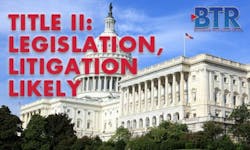Congressional Republicans, reeling from the refusal of FCC Chairman Tom Wheeler to testify before the House Oversight and Reform Committee the day before the scheduled vote, have issued a shot across the bow. Rep. Marsha Blackburn (R-TN) reintroduced legislation that essentially would render the net neutrality rules null and void and would prevent the FCC from writing new ones. H.R. 1212, the Internet Freedom Act, has 19 original co-sponsors.
In a statement, Blackburn said the reclassification of Internet service providers as common carriers under Title II is "further proof that the Obama administration will stop at nothing in their efforts to control the Internet."
Rep. Greg Walden, chairman of the House Subcommittee on Communications and Technology, also had harsh words for the Feb. 26 ruling. He called the decision "illogical" and "illegal" as well as a "total overreach" and called the notion that the FCC is an independent agency, "fiction."
"It's a relationship directly out of the White House," Walden said during the American Cable Association Summit in Washington, DC, last week. He noted that any potential bad behavior - throttling, paid prioritization, blocking - could be prevented legislatively.
On the other side of the coin, Gigi Sohn, who serves as Wheeler's counselor, told ACA Summit attendees there will be a "light-touch application" of Title II that will not affect business "in any negative way." "We have applied things like privacy, consumer protections against billing fraud, disabled protections. These are the requirements, but I don't think you will find them burdensome."
Sohn also told ACA attendees that fears about rate regulation "shouldn't keep (them) up at night," and called claims about them "scare tactics" by Title II opponents. "We have decided not to apply every single administrative mechanism that would make rate regulation possible," Sohn said.
Ross Lieberman, ACA senior VP of government affairs, said his organization might have to "agree to disagree" on whether member providers would be burdened, and pointed out that the order has not yet been released in its entirety. This will be done after FCC staff has had time to respond to the dissenting opinions of the two Republican FCC Commissioners, Sohn said.
In his dissenting statement, Commissioner Michael O'Rielly said that while it may seem Title II will be used in a limited way to support net neutrality, "... net neutrality is now the pretext for deploying Title II to a far greater extent than anyone could have imagined." He said the Commission has tried to hide this fact, by releasing only a "fact" sheet and not the text of the draft.
Commissioner Ajit Pai said the plan could mean as much as $11 billion a year in new taxes on broadband and result in slower broadband speeds as evidenced by the fact that 82% of Americans have access to 25 Mbps broadband speeds, while in Europe, where broadband is regulated, only 54% of residents do. Pai added that the so-called "light-touch" framework isn't light, but rather weighted with caveats.
"In discussing additional rate regulation, tariffs, last-minute unbundling, burdensome administrative filing requirements, accounting standards, and entry and exit regulation, the plan repeatedly states that it is only forbearing 'at this time.' For other rules, the FCC will refrain 'for now,'" Pai said.
One of the arguments against Title II regulation has been that it will slow investment by affected companies. Wheeler, in an interview with Bloomberg at the Mobile World Congress, said the rules were built on a mobile model, which would ensure "adequate investment."
Even still, analysts like Laura Martin, managing director at Needham & Co., took such steps as downgrading Time Warner Cable (NYSE:TWC) to underperform based on Title II. Specifically, if the ruling is upheld by the courts, the value of TWC falls 10-20%. "The risk is rising that ROICs (return on investment capital) on broadband will be less profitable over the next 10 years over the past 10 years when only economics determined investment levels."
Needham added that if the FCC is committed to its words that fast Internet speeds are a "right," there is an implied tax or universal service fund to be paid by providers. "The FCC wants companies to finish upgrading the last mile across the U.S. and then regulate the price and terms."
For its part, Comcast (NASDAQ:CMCSA) EVP David Cohen blogged that while the company doesn't agree about the necessity of Title II and is "encouraged" about apparent forbearance from various provisions, "we have not yet read the Order as adopted by the Commission, and we are concerned with what some have reported as incomplete legal forbearance in important areas."
Only after it has a chance to review the complete order can Comcast "engage in additional internal scrutiny on what our investment plans with respect to broadband will be going forward," Cohen said, noting that the only certainty is litigation unless Congress acts.
"We are confident this can be done in a bipartisan manner with a consensus approach that accomplishes the common goals of stakeholders on all sides of the open Internet debate," Cohen said.
Coming at it from a different perspective, Incognito Software Systems President and CEO Stephane Bourque said that the Internet of Things is continuing to grow and therefore innovation is unlikely to stop.
"Competitive service providers will always find new ways of developing services and tools that meet the demands of their subscribers," he said. "Wireless providers in the United States have been governed under similar rules for over 21 years and the industry has continuously invested in new services and technologies."
For more quotes for and against the FCC's rules, see "Top 10 Title II Quotes (so far)" and "Title II: More from the Top."
